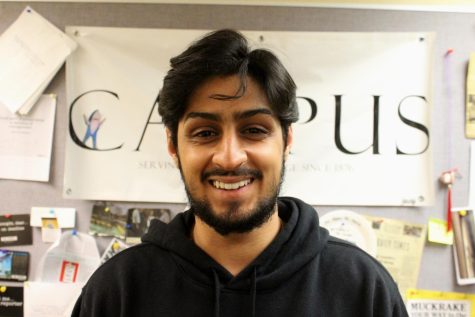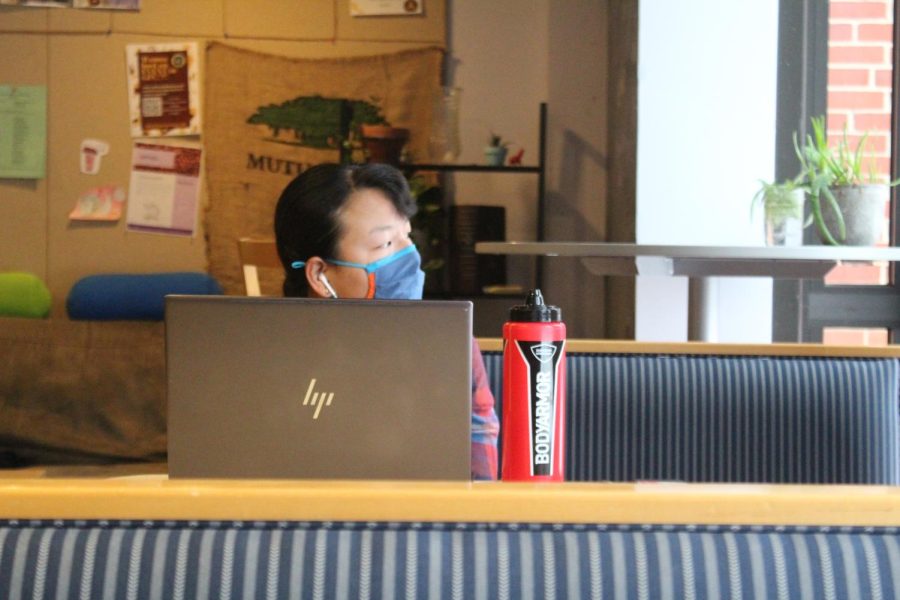ACHA updates COVID-19 guidelines, mandating masks only in classrooms
Gabriela Grachen, ’22, wears a mask while working in Grounds for Change.
The Allegheny College Health Agency issued an email update to the Allegheny College campus community regarding the mask mandate which previously required members of the campus community to wear masks in all indoor areas of campus.
The update, which was released on Friday, Jan. 21, maintained that masking will be mandatory only in classrooms until the end of module one.
ACHA declined to comment to The Campus.
With the United States averaging over one million COVID-19 cases daily, there is much confusion among the campus community not only regarding the recent update on the masking mandate but also on the in-person operation of module one this semester.
The faculty voted in spring 2021 to continue with module one in spring 2022 as a precautionary measure in case COVID-19 cases were rising again.
Associate Professor of Psychology and Neuroscience Allison Connell Pensky believes that having a remote module one this spring semester was the original intention of having module one in place.
“The decision to have module one was taken to help mitigate COVID on campus with the thought that when we come back together after the holidays from across the country and the world, we are going to be annoyingly carrying the virus with us,” Pensky said.
Pensky mentioned that many members of the faculty also share the concerns regarding module one that many students around the campus are facing. Students and faculty members alike are not convinced that ACHA is taking strong enough preventative action to stop the spread of COVID. Moreover, some members of the campus community are concerned about their questions being left unanswered.
“It’s important to note that I’m not speaking for the entire faculty or the administration, but I can say that there are members of faculty who share the same concerns as students regarding the handling of COVID-19 on campus and module one,” Pensky said.
Skyler Roemele, ’22, expressed her confusion and concern about the in-person operation of module one.
“I honestly don’t get why we’re all here in person for module one when it was made to be remote,” Roemele said. “Why not just have the regular semester rather than burdening us with taking a full semester course in three weeks?”
Naboni Thomas Kidane, ’24, shared Roemele’s concerns.
“Module one demands a lot from students and sometimes it can be very tough to handle,” Kidane said. “If we were all learning remotely then it would make sense but I don’t understand why we are doing three-hour-long classes when we are all in person.”
Pensky expressed her concern and shock at the recent update to the masking mandate only requiring masks in classrooms.
“It’s hard to believe that the restrictions and guidelines for COVID are so relaxed given the situation of the virus not just in the country but Crawford County,” Pensky said. “Just wearing masks in classrooms is not enough and that too is most likely being mandated because students are in there for three hours.”
Pensky emphasized the effectiveness of masks in helping limit the spread of the virus.
“Masks were required during the first week of module one all over campus and by the end of the week we saw the cases go down and start to be contained,” Pensky said. “It’s perplexing that masks are being mandated only in classrooms after the effectiveness of masks was just proven to everyone last week.”
But not everyone agrees. Justin Gibson, ’23, noted that a single cloth mask isn’t the be-all-end-all when it comes to facial coverings.
“I also feel like wearing the masks is almost just like a “feel-safer” thing, because if you actually wanted to be safe about it you would wear an N-95 (mask) that is sterile, and a sterile cloth mask on top of that,” Gibson said. “Not everyone is going to be able to do that because there’s not enough N-95s to be having a sterile one every single day every time you leave an area where you take off your mask. As soon as you take off the mask, it’s no longer considered sterile and also not a safe practice to wear.”
N-95 masks are available at the Wise Center at the COVID-19 testing center
While Gibson masks in class and in crowded areas like McKinley’s Dining, the outdoors
“I don’t wear it in the Game Room or outside because it gives me anxiety to have something covering my face with certain mental health issues I have,” Gibson said.
James Morgan, ’25, who was playing pool in the Game Room with Gibson, thought that the current restrictions were sensible.
“Obviously, I like that (masks are mandated) in the classrooms because I have like 40 people in my class and we all sit next to each other,” Morgan said. “But like, even (being in the Game Room). We’re not masked up but we’re still like six feet away from each other.”
Pensky also mentioned that many of these courses, which were constructed by faculty for module one last year, are facing a new set of challenges due to their transition from the online to in-person model.
“Remotely designed courses allow you to do different things and faculty members designed module one courses to be that (remote),” Pensky said. “And now they’re having to teach these courses in-person which is a challenge in itself.”
Pensky expressed her concern about students having to isolate themselves despite the intensity of module one.
“These courses are intensive and even missing a single class session can be detrimental to students,” Pensky said. “There is no indication on what to do if a student has to miss a class because they’re isolating.”
Kidane shared Pensky’s concerns.
“It’s already hard enough to manage the workload of a three-hour class every day but having to worry about COVID along with it is very stressful,” Kidane said. “We are all careful and nobody wants to get COVID but isolating during module one could mean failing a class.”
Pensky commended the faculty and students’ efforts in making module one work. She recognized everyone’s efforts to go ahead with their work every day despite all the challenges that COVID and the intensity of module one present them with.
A lot of confusion is widespread across the campus regarding module one and ACHA’s silence on the situation has not helped clear said confusion, according to Roemele.
“The ACHA hasn’t helped us by refusing to speak on the situation,” Roemele said. “It doesn’t help the students and teachers who go into class every day with the virus on their mind to not have their issues and concerns be even addressed by the ACHA.”
Pensky commented on ACHA’s initial email sent out on Jan. 10 that introduced the mask mandate and stated the in-person conduction of module one.
“In the initial email, Dr. Morrow had mentioned the booster shot to be an effective method of fighting the virus,” Pensky said. “A lot of scientific research suggests that this is not necessarily the case and Dr. Morrow had no answers when members of the faculty asked about the credibility of the source of this information.”
Pensky did not elaborate on the scientific research she was referring to.
Roemele believes that there is a lot of misinformation regarding the virus on campus and the practices with which to limit its spread.
“It’s difficult to enforce restrictions once people become used to not wearing a mask or distancing,” Roemele said. “Regardless of people’s attitudes, I think that certain decisions have to be made that keep everyone’s well-being in mind because we often don’t realize the importance of keeping one another safe from the spread of the virus.”
Pensky emphasized her disappointment and discomfort regarding the update to the mask mandate and the general response of ACHA regarding the COVID-19 situation in the U.S. and across the world.
“I don’t feel comfortable coming back to campus during such a time,” Pensky said. “I have a family with members who don’t have the same protection against the virus and the last thing I would want is to bring the virus home with me.”

Hassan Javed is a junior from Lahore, Pakistan. He is majoring in Communication and Media Studies while minoring in Psychology. This is his third year...

Sami Mirza is a senior from many different places. He is majoring in International Studies with a focus on the Middle East and North Africa and minor in...











Al Coppolo • Jan 29, 2022 at 7:42 am
At a college as small as Allegheny who once prided itself on its ability to cultivate communication skills in its students, why are there so many communication problems between the students, staff, administration, and faculty?
Al Coppolo ‘78